Tag Archives: North Atlantic right whale
2017–2025 North Atlantic Right Whale Unusual Mortality Event
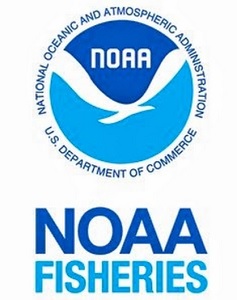 Beginning in 2017, elevated mortalities in North Atlantic right whales (Eubalaena glacialis) were documented in Canada and the United States and necessitated an Unusual Mortality Event (UME) be declared. The whales impacted by the UME include dead, injured, and sick individuals, who represent more than 20 percent of the population, which is a significant impact on an endangered species where deaths are outpacing births. Additionally, research demonstrates that only about 1/3 of right whale deaths are documented. The preliminary cause of mortality, serious injury, and morbidity (sublethal injury and illness) in most of these whales is from entanglements or vessel strikes. Endangered North Atlantic right whales are approaching extinction. There are approximately 370 individuals remaining, including about 70 reproductively active females. Human impacts continue to threaten the survival of this species. The many individual whales involved in the UME are a significant setback to the recovery of this endangered species. Links, graphics, more, >>CLICK TO READ<< 10:29
Beginning in 2017, elevated mortalities in North Atlantic right whales (Eubalaena glacialis) were documented in Canada and the United States and necessitated an Unusual Mortality Event (UME) be declared. The whales impacted by the UME include dead, injured, and sick individuals, who represent more than 20 percent of the population, which is a significant impact on an endangered species where deaths are outpacing births. Additionally, research demonstrates that only about 1/3 of right whale deaths are documented. The preliminary cause of mortality, serious injury, and morbidity (sublethal injury and illness) in most of these whales is from entanglements or vessel strikes. Endangered North Atlantic right whales are approaching extinction. There are approximately 370 individuals remaining, including about 70 reproductively active females. Human impacts continue to threaten the survival of this species. The many individual whales involved in the UME are a significant setback to the recovery of this endangered species. Links, graphics, more, >>CLICK TO READ<< 10:29
Vineyard Wind and DOJ dispute ACK For Whales Supreme Court case
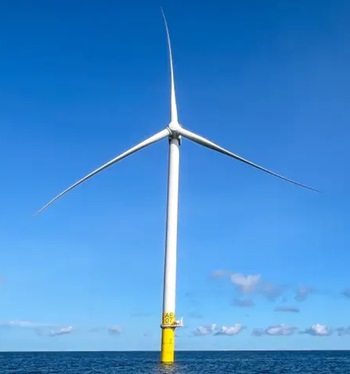 ACK For Whales is steadfast in their belief that their case against Vineyard Wind and federal agencies should be heard by the Supreme Court. Judges at the state and federal level have already dismissed their arguments in court twice the last two years, but that doesn’t mean their case doesn’t deserve to be heard by the highest court in the land, according to court filings from the local opposition group filed earlier this month. “That this petition focuses on only one aspect of the agency’s shortcomings . . . its failure to consider the cumulative impacts of other known, authorized, planned, and soon-to-be-approved projects—does not render this petition unworthy of review by (the Supreme Court). And that the First Circuit gave short shrift to (ACK For Whales’) arguments, including this one, equally does not render this petition unworthy of review,” reads a reply to critiques from federal agencies and Vineyard Wind filed Dec. 20. more, >>CLICK TO READ<< 07:22
ACK For Whales is steadfast in their belief that their case against Vineyard Wind and federal agencies should be heard by the Supreme Court. Judges at the state and federal level have already dismissed their arguments in court twice the last two years, but that doesn’t mean their case doesn’t deserve to be heard by the highest court in the land, according to court filings from the local opposition group filed earlier this month. “That this petition focuses on only one aspect of the agency’s shortcomings . . . its failure to consider the cumulative impacts of other known, authorized, planned, and soon-to-be-approved projects—does not render this petition unworthy of review by (the Supreme Court). And that the First Circuit gave short shrift to (ACK For Whales’) arguments, including this one, equally does not render this petition unworthy of review,” reads a reply to critiques from federal agencies and Vineyard Wind filed Dec. 20. more, >>CLICK TO READ<< 07:22
Endangered whales found entangled in fishing gear off Massachusetts coast
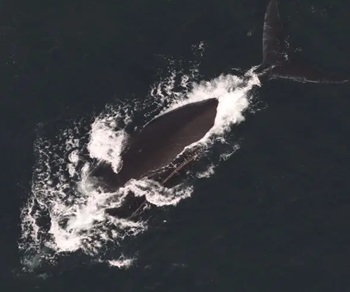 Two endangered whales have been discovered entangled in fishing line off the coast of Massachusetts, the National Oceanic and Atmospheric Administration announced Tuesday, as biologists warned one of the whales is “likely to die.” NOAA said the pair of North Atlantic right whales was found during an aerial survey on Dec. 9, approximately 50 miles southeast of Nantucket. NOAA Fisheries biologists said a juvenile male, #5110, has a thick line that passes across his head and once across his back, leaving him “seriously injured” and likely to die. NOAA said it is currently monitoring the federally protected whales and will determine “if entanglement responses will be possible.” Video, more, >>CLICK TO READ<< 08:11
Two endangered whales have been discovered entangled in fishing line off the coast of Massachusetts, the National Oceanic and Atmospheric Administration announced Tuesday, as biologists warned one of the whales is “likely to die.” NOAA said the pair of North Atlantic right whales was found during an aerial survey on Dec. 9, approximately 50 miles southeast of Nantucket. NOAA Fisheries biologists said a juvenile male, #5110, has a thick line that passes across his head and once across his back, leaving him “seriously injured” and likely to die. NOAA said it is currently monitoring the federally protected whales and will determine “if entanglement responses will be possible.” Video, more, >>CLICK TO READ<< 08:11
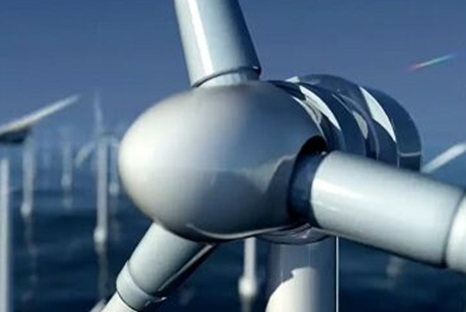
BOEM admits potentially irreversible harm to whales, fisheries, and seabirds
A government regulator recognizing offshore wind’s destructive environmental effects is as rare as a North Atlantic right whale. But a recent, 600-plus page report from the Bureau of Ocean Energy Management (BOEM) admits that the offshore wind development planned for the New York Bight, the triangular area bordered by the New Jersey and Long Island coastlines may irreversibly harm whales, commercial and recreational fisheries, and seabirds. The BOEM report is the agency’s first to evaluate the cumulative impacts of offshore wind development. Its authors cite a wide range of potential effects, from negligible (or even beneficial) to major. Acknowledging potentially “major” harms is a radical departure from the agency’s previously accepted Environmental Impact Statements for offshore wind projects, which have always focused on the impacts of individual projects, rather than the cumulative impacts of multiple projects. more, >>CLICK TO READ<< 07:28
First Circuit likely to save the whales despite lobstermen’s complaints
 An epic sea battle unfolded at the First Circuit Tuesday as Massachusetts fishermen tried to harpoon federal regulations that protect the North Atlantic right whale. But it appeared the judges were on the whales’ side and, as in “Moby Dick,” the fishermen may end up shipwrecked. At issue is a federal rule that limits lobster and Jonah crab fisheries’ use of buoy lines, which can entangle and kill whales. The fishermen’s lawyer, Daniel Cragg, told the judges that the rule resulted from Congress making a “drafting failure,” but the judges seemed incredulous. more, >>CLICK TO READ<< 10:52
An epic sea battle unfolded at the First Circuit Tuesday as Massachusetts fishermen tried to harpoon federal regulations that protect the North Atlantic right whale. But it appeared the judges were on the whales’ side and, as in “Moby Dick,” the fishermen may end up shipwrecked. At issue is a federal rule that limits lobster and Jonah crab fisheries’ use of buoy lines, which can entangle and kill whales. The fishermen’s lawyer, Daniel Cragg, told the judges that the rule resulted from Congress making a “drafting failure,” but the judges seemed incredulous. more, >>CLICK TO READ<< 10:52
Right whale population grows 4%, but extinction remains a threat
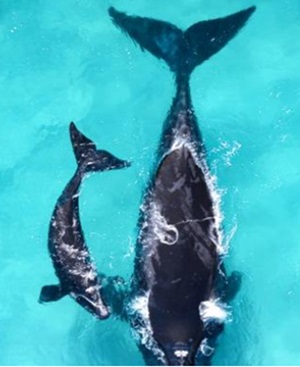 Conservationists are calling on the government, shipping and fishing industries to save the North Atlantic right whale from extinction despite an increase in its population. Researchers studying the whales said this week that the population increased to an estimated 372 in 2023. That’s an increase of about four percent from 2020, and “heartening news” after the whale’s population fell by about 25 percent from 2010 to 2020. The population of the right whale, which can weigh up to 150,000 pounds (68,039 kilograms) and lives off the East Coast, plummeted in the 2010s. Stressed by global warming and vulnerable to ship collisions and entanglement in fishing gear, their numbers fell to fewer than 360 by the early 2020s. more, >>CLICK TO READ<< 12:29
Conservationists are calling on the government, shipping and fishing industries to save the North Atlantic right whale from extinction despite an increase in its population. Researchers studying the whales said this week that the population increased to an estimated 372 in 2023. That’s an increase of about four percent from 2020, and “heartening news” after the whale’s population fell by about 25 percent from 2010 to 2020. The population of the right whale, which can weigh up to 150,000 pounds (68,039 kilograms) and lives off the East Coast, plummeted in the 2010s. Stressed by global warming and vulnerable to ship collisions and entanglement in fishing gear, their numbers fell to fewer than 360 by the early 2020s. more, >>CLICK TO READ<< 12:29
On US coast, wind power foes embrace ‘Save the Whales’ argument
 Whether from real concern for marine animals or doubts about renewable energy, the anti-wind power movement has been growing along the US East Coast, with some trying to blame a surge in whale strandings on the growth of offshore energy projects. Their attempt to link the two seems to be resonating, despite what scientists say is a clear lack of evidence. When Lauren Brandkamp and her team from the nonprofit Whale and Dolphin Conservation organization in Massachusetts carry out a rescue on an area beach, one of the first questions bystanders ask is: “Was this wind?” Wind power critics have organized coastal town gatherings, posted “Save the Whales” signs and filed lawsuits in a bid to bury new wind projects under crushing litigation fees. A recent surge in whale strandings or deaths has given them added ammunition. Photos, more, >>CLICK TO READ<< 08:41
Whether from real concern for marine animals or doubts about renewable energy, the anti-wind power movement has been growing along the US East Coast, with some trying to blame a surge in whale strandings on the growth of offshore energy projects. Their attempt to link the two seems to be resonating, despite what scientists say is a clear lack of evidence. When Lauren Brandkamp and her team from the nonprofit Whale and Dolphin Conservation organization in Massachusetts carry out a rescue on an area beach, one of the first questions bystanders ask is: “Was this wind?” Wind power critics have organized coastal town gatherings, posted “Save the Whales” signs and filed lawsuits in a bid to bury new wind projects under crushing litigation fees. A recent surge in whale strandings or deaths has given them added ammunition. Photos, more, >>CLICK TO READ<< 08:41
Rare whale died of chronic entanglement in Maine fishing gear
 The North Atlantic right whale was found dead off Martha’s Vineyard in January. The whales are declining in population and are at the center of efforts to more tightly regulate shipping and commercial fishing off the East Coast. “The fact is we know that entanglement in Maine gear is extremely rare. This is the first reported entanglement of a right whale in Maine lobster gear in 20 years and the first death attributed to the fishery,” the Maine Lobstermen’s Association said in a statement. “Maine lobstermen have made significant changes to how they fish over the last 25 years to avoid entanglement.” more, >>CLICK TO READ<< 06:55
The North Atlantic right whale was found dead off Martha’s Vineyard in January. The whales are declining in population and are at the center of efforts to more tightly regulate shipping and commercial fishing off the East Coast. “The fact is we know that entanglement in Maine gear is extremely rare. This is the first reported entanglement of a right whale in Maine lobster gear in 20 years and the first death attributed to the fishery,” the Maine Lobstermen’s Association said in a statement. “Maine lobstermen have made significant changes to how they fish over the last 25 years to avoid entanglement.” more, >>CLICK TO READ<< 06:55
Right whales and offshore wind: reflections on an uneasy coexistence
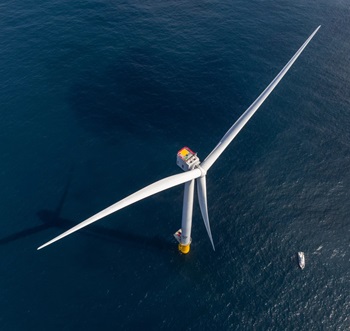 Michael Moore has spent decades studying North Atlantic right whales. He’s seen somewhere around 150 of them. It’s a feat, given that now there are just about 360 left in the world. But the veterinarian, author, and scientist emeritus from the Woods Hole Oceanographic Institution had never seen an offshore wind farm up close — until last week. “Look at them. All out in neat little rows,” he said, standing at the rear of a 53-foot charter boat that offered a closeup view of construction on Vineyard Wind, 15 miles south of Martha’s Vineyard. About half of the planned 62 turbines are fully constructed, reaching more than 250 meters into the sky. When the boat slowed down to pass beneath one of the turbines, Moore was awestruck by the length of a blade. “Right whales are 40 to 50 feet,” he said. “So, you can stretch seven right whales along the length of one of these blades.” Photos, more, >>CLICK TO READ<< 16:48
Michael Moore has spent decades studying North Atlantic right whales. He’s seen somewhere around 150 of them. It’s a feat, given that now there are just about 360 left in the world. But the veterinarian, author, and scientist emeritus from the Woods Hole Oceanographic Institution had never seen an offshore wind farm up close — until last week. “Look at them. All out in neat little rows,” he said, standing at the rear of a 53-foot charter boat that offered a closeup view of construction on Vineyard Wind, 15 miles south of Martha’s Vineyard. About half of the planned 62 turbines are fully constructed, reaching more than 250 meters into the sky. When the boat slowed down to pass beneath one of the turbines, Moore was awestruck by the length of a blade. “Right whales are 40 to 50 feet,” he said. “So, you can stretch seven right whales along the length of one of these blades.” Photos, more, >>CLICK TO READ<< 16:48
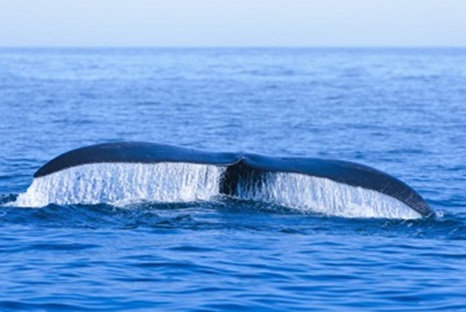
International Whaling Commission meets this week, will they discuss the US whale slaughter? By Jim Lovgren
The International Whaling Commission [IWC] meets this week from September 23 rd to the 27 th , in Lima Peru. The commission was established in 1946 and is a specialized regional fishery management organization created to provide for the proper conservation of various different Whale species, with the goal of supporting the orderly development of the Whaling industry. For two hundred years fishing vessels hunted down Whales bringing some species to the brink of extinction. Unlike the American slaughter of Buffalo, where they were killed solely for their hide, and the carcass left to rot, the Whaling industry utilized almost every part of these animals, with many indigenous populations being dependent on them as their main food source. This brings us to the present marine mammal slaughter being perpetrated by multi-national wind companies along the US east coast. In 2016 NOAA declared an unusual marine mammal mortality event was taking place with Humpback, Minke, and Northern Right Whales. Around that time research and construction was started on the Block Island wind project. more, >>CCLICK TO READ<< 16:11
N.B. fishermen test new gear in bid to stay on the water when right whales spotted
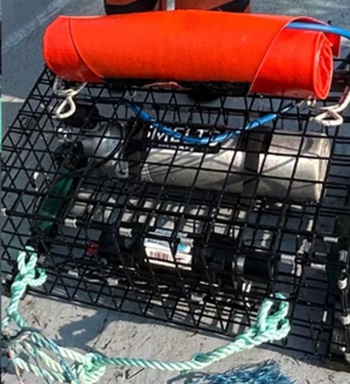 As of Aug. 13, fishermen in New Brunswick were forced to pull their traps and stop fishing on 35 separate occasions this year after North Atlantic right whales were spotted. But a new pilot program in the southwest is trying to keep lobster and crab boats on the water. Crab fisherman Greg Beckerton and two lobster fishermen, Judson Mitchell and Peter Mawhinney, are testing five new types of ropeless gear, with the goal of choosing two for a wider test in the spring. Beckerton hopes that alternative fishing gear that limits the use of traditional rope will allow fishing to continue when whales are in the area. “In a closed-area situation we could use this gear, and it would definitely be an advantage,” he said. Photos, more, >>CLICK TO READ<< 09:31
As of Aug. 13, fishermen in New Brunswick were forced to pull their traps and stop fishing on 35 separate occasions this year after North Atlantic right whales were spotted. But a new pilot program in the southwest is trying to keep lobster and crab boats on the water. Crab fisherman Greg Beckerton and two lobster fishermen, Judson Mitchell and Peter Mawhinney, are testing five new types of ropeless gear, with the goal of choosing two for a wider test in the spring. Beckerton hopes that alternative fishing gear that limits the use of traditional rope will allow fishing to continue when whales are in the area. “In a closed-area situation we could use this gear, and it would definitely be an advantage,” he said. Photos, more, >>CLICK TO READ<< 09:31
Bill to Support Maine’s Lobster Industry Clears Appropriations Committee
 U.S. Senator Susan Collins, Vice Chair of the Senate Appropriations Committee, announced that she advanced significant funding and key language to support Maine’s lobster industry in the Fiscal Year (FY) 2025 Commerce, Justice, Science, and Related Agencies (CJS) Appropriations bill. The bill, which was officially approved by the Senate Appropriations Committee today, now awaits consideration by the full Senate and House. “This funding would support Maine’s lobster industry by improving the incomplete and imprecise science and research upon which the federal government relies. The flawed and incomplete data being used to inform regulations has created unnecessary, burdensome requirements for Maine lobstermen and women,” said Senator Collins. “As the Vice Chair of the Appropriations Committee, I will continue to advocate for this funding as the appropriations process moves forward.” more, >>CLICK TO READ<< 05:57
U.S. Senator Susan Collins, Vice Chair of the Senate Appropriations Committee, announced that she advanced significant funding and key language to support Maine’s lobster industry in the Fiscal Year (FY) 2025 Commerce, Justice, Science, and Related Agencies (CJS) Appropriations bill. The bill, which was officially approved by the Senate Appropriations Committee today, now awaits consideration by the full Senate and House. “This funding would support Maine’s lobster industry by improving the incomplete and imprecise science and research upon which the federal government relies. The flawed and incomplete data being used to inform regulations has created unnecessary, burdensome requirements for Maine lobstermen and women,” said Senator Collins. “As the Vice Chair of the Appropriations Committee, I will continue to advocate for this funding as the appropriations process moves forward.” more, >>CLICK TO READ<< 05:57
The Offshore Wind Energy Scandal Is Even Worse Than You Think
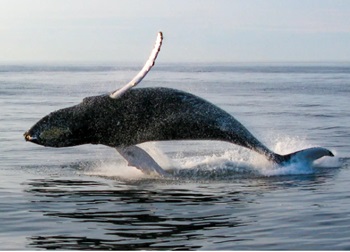 These 11 charts show how America’s biggest NGOs are colluding with foreign corporations that want to industrialize our oceans with thousands of turbines that will hurt whales and ratepayers Two of Europe’s biggest energy companies are abandoning the SS Offshore Wind. In May, Shell, the UK-based oil and gas giant (2023 revenue: $317 billion), announced that it was cutting staff from its offshore wind business because, according to Bloomberg, the company has decided to focus on markets that “deliver the most value for our investors and customers.” Bloomberg also reported that the staff cuts were made after the departures of top executives in the company’s offshore wind and renewable power businesses. Lots of informative grafs. more, >>CLICK TO READ<< 09:29
These 11 charts show how America’s biggest NGOs are colluding with foreign corporations that want to industrialize our oceans with thousands of turbines that will hurt whales and ratepayers Two of Europe’s biggest energy companies are abandoning the SS Offshore Wind. In May, Shell, the UK-based oil and gas giant (2023 revenue: $317 billion), announced that it was cutting staff from its offshore wind business because, according to Bloomberg, the company has decided to focus on markets that “deliver the most value for our investors and customers.” Bloomberg also reported that the staff cuts were made after the departures of top executives in the company’s offshore wind and renewable power businesses. Lots of informative grafs. more, >>CLICK TO READ<< 09:29
North Atlantic right whale seen off Ireland for first time in 114 years
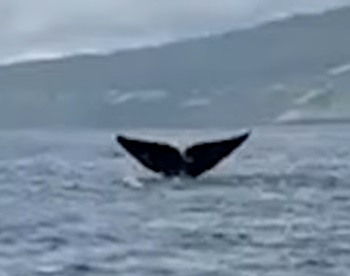 Holidaymaker Adrian Maguire, from Co Tyrone, glimpsed the large, dark body of the whale on the surface of the water while out fishing for mackerel. “I just looked in amazement at the size of it,” said Mr Maguire. “I’ve never experienced that in my life.” watch video here He described how he let his boat drift while he, his wife and two friends watched the whale for about an hour in McSwynes Bay, Co Donegal, off the north-west coast of Ireland. “The sound of the blowing — it’s great to hear that in real life,” said Mr Maguire. It is the first sighting of a North Atlantic right whale off Ireland in 114 years, said Conor Ryan, honorary research fellow at the Scottish Association for Marine Science. Short Video, more, >>CLICK TO READ<< 12:26
Holidaymaker Adrian Maguire, from Co Tyrone, glimpsed the large, dark body of the whale on the surface of the water while out fishing for mackerel. “I just looked in amazement at the size of it,” said Mr Maguire. “I’ve never experienced that in my life.” watch video here He described how he let his boat drift while he, his wife and two friends watched the whale for about an hour in McSwynes Bay, Co Donegal, off the north-west coast of Ireland. “The sound of the blowing — it’s great to hear that in real life,” said Mr Maguire. It is the first sighting of a North Atlantic right whale off Ireland in 114 years, said Conor Ryan, honorary research fellow at the Scottish Association for Marine Science. Short Video, more, >>CLICK TO READ<< 12:26
Nantucket Group Fighting Vineyard Wind Will Take Case To U.S. Supreme Court
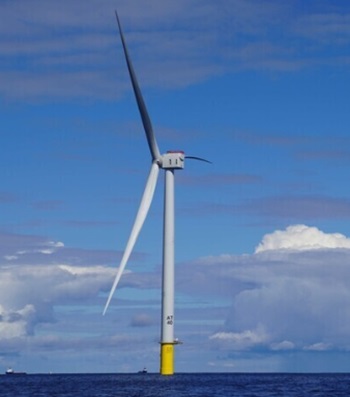 After its arguments against the Vineyard Wind project were rejected by a federal judge in April, the Nantucket group ACK 4 Whales will attempt to take its case to the U.S. Supreme Court. “There are no do-overs when the last whale is killed off,” said Val Oliver, president of ACK 4 Whales. “We will be seeking a writ of certiorari to the Supreme Court to ask for the reversal of the First Circuit’s legal errors made in our case,” Oliver added. “We believe this is the first cert. petition being filed in the wake of the Supreme Court’s decision in Loper Bright to challenge offshore wind development..” After its arguments against the Vineyard Wind project were rejected by a federal judge in April, the Nantucket group ACK 4 Whales will attempt to take its case to the U.S. Supreme Court. more. >>CLICK TO READ<< 13:45
After its arguments against the Vineyard Wind project were rejected by a federal judge in April, the Nantucket group ACK 4 Whales will attempt to take its case to the U.S. Supreme Court. “There are no do-overs when the last whale is killed off,” said Val Oliver, president of ACK 4 Whales. “We will be seeking a writ of certiorari to the Supreme Court to ask for the reversal of the First Circuit’s legal errors made in our case,” Oliver added. “We believe this is the first cert. petition being filed in the wake of the Supreme Court’s decision in Loper Bright to challenge offshore wind development..” After its arguments against the Vineyard Wind project were rejected by a federal judge in April, the Nantucket group ACK 4 Whales will attempt to take its case to the U.S. Supreme Court. more. >>CLICK TO READ<< 13:45
Feds say “damn the whales” in the Gulf of Maine
 Biden’s Bureau of Ocean Energy Management (BOEM) proposes to build a huge amount of floating offshore wind in the Gulf of Maine. As required by law, it has published for public comment a draft Environmental Assessment of the area designated for this monster project. But insanely, there is no assessment of the project, just of the area without the project. I am not making this up. This place is properly called the Wind Energy Area (WEA) because that is where the wind energy will come from. BOEM says they plan to issue eight leases initially with a monster development potential of 15,000 MW. Given that 15 MW is the biggest turbine available that amounts to 1,000 or more huge turbines. A second phase might add another thousand of so. more, >>CLICK TO READ<< 12:29
Biden’s Bureau of Ocean Energy Management (BOEM) proposes to build a huge amount of floating offshore wind in the Gulf of Maine. As required by law, it has published for public comment a draft Environmental Assessment of the area designated for this monster project. But insanely, there is no assessment of the project, just of the area without the project. I am not making this up. This place is properly called the Wind Energy Area (WEA) because that is where the wind energy will come from. BOEM says they plan to issue eight leases initially with a monster development potential of 15,000 MW. Given that 15 MW is the biggest turbine available that amounts to 1,000 or more huge turbines. A second phase might add another thousand of so. more, >>CLICK TO READ<< 12:29
Conservative groups cleared to continue legal fight to protect whales from Biden-backed offshore wind farm
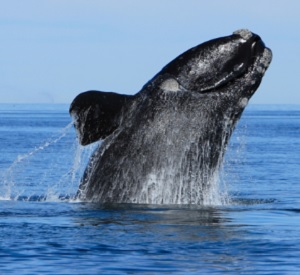 A coalition of conservative organizations have standing to continue fighting a Biden administration wind project in Virginia, a federal judge determined. However, U.S. District Judge Loren L. AliKhan of the District of Columbia, a Biden appointee, denied the plaintiff’s petition for a preliminary injunction to halt construction of the Coastal Virginia Offshore Wind project from going forward. The plaintiffs sued the Biden administration and Dominion Energy to protect the North Atlantic right whale under the Endangered Species Act. more, >>CLICK TO READ<< 08:56
A coalition of conservative organizations have standing to continue fighting a Biden administration wind project in Virginia, a federal judge determined. However, U.S. District Judge Loren L. AliKhan of the District of Columbia, a Biden appointee, denied the plaintiff’s petition for a preliminary injunction to halt construction of the Coastal Virginia Offshore Wind project from going forward. The plaintiffs sued the Biden administration and Dominion Energy to protect the North Atlantic right whale under the Endangered Species Act. more, >>CLICK TO READ<< 08:56
Biden’s Policies Threaten Small Lobster Fishers and Right Whales
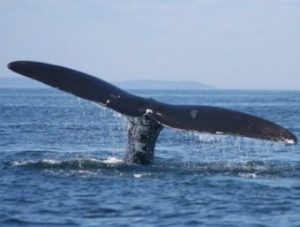 While lobstermen likely haven’t been contributing to NARW deaths, it is undisputed that vessel strikes, both in U.S. and foreign waters, have. Which brings us to the Biden administration’s decision to construct thousands of offshore wind turbines smack-dab in the middle of the whale’s migration route and habitat. Biden’s East Coast offshore wind initiative could qualify as an extinction level event for the North Atlantic right whale. Despite this, the Biden administration plans to build 30,000 megawatts of traditional offshore wind facilities (with structures attached to the ocean floor) in federal waters by 2030, and an additional 15,000 megawatts of floating industrial offshore wind power by 2035. more, >>CLICK TO READ<< 06:31
While lobstermen likely haven’t been contributing to NARW deaths, it is undisputed that vessel strikes, both in U.S. and foreign waters, have. Which brings us to the Biden administration’s decision to construct thousands of offshore wind turbines smack-dab in the middle of the whale’s migration route and habitat. Biden’s East Coast offshore wind initiative could qualify as an extinction level event for the North Atlantic right whale. Despite this, the Biden administration plans to build 30,000 megawatts of traditional offshore wind facilities (with structures attached to the ocean floor) in federal waters by 2030, and an additional 15,000 megawatts of floating industrial offshore wind power by 2035. more, >>CLICK TO READ<< 06:31

Seacoast fishermen say they don’t support wind turbines in Gulf of Maine
A federal group wants to put wind turbines in the Gulf of Maine, but some Seacoast fishermen said they don’t want them. On Wednesday night, several fishermen said they can’t get on board with the idea of wind turbines in the Gulf of Maine, but the Bureau of Ocean Energy Management said they’re trying to be as safe as possible with this potential project. The proposal would allow the state of Maine to build 12 floating turbines about 30 miles off the coast, which some fishermen said would cut them off from where they fish. The project, hoping to protect the endangered North Atlantic Right Whale while supporting the Biden administration’s goal to deploy 30 gigawatts of offshore wind by 2030, is on track to be the first floating offshore wind farm in the United States, but more approvals are still needed. Video, more, >>CLICK TO READ<< 16:38
Lobster dispute settled a day after fishermen defy order to remove traps
 A brewing battle between the federal government and lobster fishermen in northern New Brunswick appears to have come to an end. A federal closure of lobster fishing zones in the Gulf of St. Lawrence off New Brunswick’s Acadian Peninsula was being defied by hundreds of fishermen refusing to remove their traps. A news release from the Department of Fisheries and Oceans sent Thursday evening says that lobster boats will be able to fish closer to shore. “I am pleased to see DFO has adjusted the closure requirements and harvesters can now set their traps up to the 10 fathom shallow water protocol management line for the remainder of the 15-day period,” said federal Fisheries and Oceans , in the release. more, >>CLICK TO READ<< 08:50
A brewing battle between the federal government and lobster fishermen in northern New Brunswick appears to have come to an end. A federal closure of lobster fishing zones in the Gulf of St. Lawrence off New Brunswick’s Acadian Peninsula was being defied by hundreds of fishermen refusing to remove their traps. A news release from the Department of Fisheries and Oceans sent Thursday evening says that lobster boats will be able to fish closer to shore. “I am pleased to see DFO has adjusted the closure requirements and harvesters can now set their traps up to the 10 fathom shallow water protocol management line for the remainder of the 15-day period,” said federal Fisheries and Oceans , in the release. more, >>CLICK TO READ<< 08:50
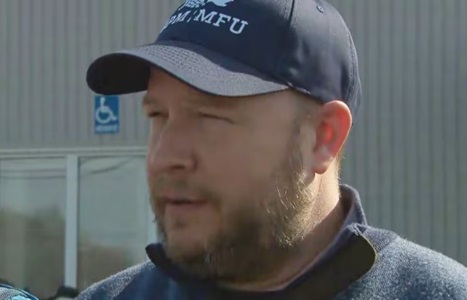
N.B. lobster fishermen defy DFO, leave traps in despite closure for North Atlantic right whales
Several fishing zones in the area were officially shut down early by the Department of Fisheries and Oceans at 5 p.m. Wednesday because of a North Atlantic right whale sighting. But at a meeting in Lamèque at the time of the deadline, about 200 members of the Maritime Fishermen’s Union decided not to remove their roughly 60,000 traps in the area. However, the fishermen say they will not go out Thursday in order to give the federal agency one more chance to negotiate. On Wednesday, a release from DFO said that the fishing zone closures, initially scheduled to last 10 days, would stay closed for the rest of the season. more, >>CLICK TO READ<< 06:56
A whale washed up dead. Greens blame a Democrat.
 Environmentalists say Chellie Pingree’s defense of the Maine lobster industry could imperil a critically endangered whale. Doing what greens want would likely send the Democrat to political extinction. Conservation advocates are publicly pressuring Pingree to overturn a law that protects Maine’s prized lobster fishery. The calls come after one of only 360 remaining North Atlantic right whales washed up dead in February entangled in Maine lobstering rope. “I think it is a little bit more of a black mark on an otherwise fairly good conservation record,” said Brett Hartl, the government affairs director at the Center for Biological Diversity, on Pingree’s support of the pro-lobstering law. It’s a rare rebuke of a longtime ally who has a near-pristine voting record on environmental issues. Pingree says she has no plans to reverse course, but the incident highlights how lawmakers continue to balance environmental concerns with the everyday lives of their constituents. more, >>CLICK TO READ<< 17:57
Environmentalists say Chellie Pingree’s defense of the Maine lobster industry could imperil a critically endangered whale. Doing what greens want would likely send the Democrat to political extinction. Conservation advocates are publicly pressuring Pingree to overturn a law that protects Maine’s prized lobster fishery. The calls come after one of only 360 remaining North Atlantic right whales washed up dead in February entangled in Maine lobstering rope. “I think it is a little bit more of a black mark on an otherwise fairly good conservation record,” said Brett Hartl, the government affairs director at the Center for Biological Diversity, on Pingree’s support of the pro-lobstering law. It’s a rare rebuke of a longtime ally who has a near-pristine voting record on environmental issues. Pingree says she has no plans to reverse course, but the incident highlights how lawmakers continue to balance environmental concerns with the everyday lives of their constituents. more, >>CLICK TO READ<< 17:57
Offshore Wind Cumulative Impact Issue Analysis
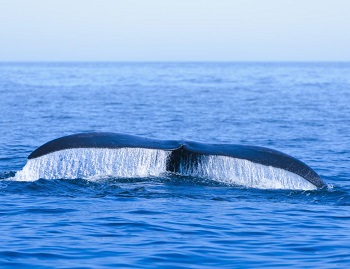 When the Feds finally do the cumulative environmental impact analysis for whales as mandated by the Endangered Species Act there are a number of basic issues to be resolved. Here is a quick look at some for the desperately endangered North Atlantic Right Whale (NARW). Cumulative refers to the combined impact of multiple offshore projects. The first issue is which projects to combine for analysis. NARW are found along the entire Atlantic coastal waters which bounds the geography. Other endangered critters are found along the Gulf and West Coasts. Projects can be in very different stages of development. Here is a hierarchy of sorts that gives several obvious options, from relatively small to enormous. more, >>CLICK TO READ<< 09:07
When the Feds finally do the cumulative environmental impact analysis for whales as mandated by the Endangered Species Act there are a number of basic issues to be resolved. Here is a quick look at some for the desperately endangered North Atlantic Right Whale (NARW). Cumulative refers to the combined impact of multiple offshore projects. The first issue is which projects to combine for analysis. NARW are found along the entire Atlantic coastal waters which bounds the geography. Other endangered critters are found along the Gulf and West Coasts. Projects can be in very different stages of development. Here is a hierarchy of sorts that gives several obvious options, from relatively small to enormous. more, >>CLICK TO READ<< 09:07

Breaking: Dominion Energy Atlantic Coast Offshore Wind Project Delayed by Lawsuit Seeking to Protect Endangered Right Whale
An order by a federal judge on Monday delayed the start of “pile driving” construction for a massive wind project off the Atlantic Coast by Dominion Energy. Judge Loren L. AliKhan convened an expedited status conference hearing in response to a coalition of three public interest groups—The Heartland Institute, the Committee for a Constructive Tomorrow (CFACT), and the National Legal and Policy Center (NLPC)—suing Dominion and the Biden administration, claiming they have not done the legally required research to determine the project won’t harm the critically endangered North Atlantic right whale. more, >>CLICK TO READ<< 14:33
Warming Waters Heat Summer’s Feast Well Before It Gets to the Kitchen
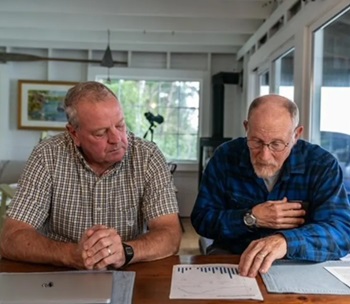 An ever-warming planet is playing havoc with the intricately interconnected web of marine life. Just as climate has long stressed human populations and driven migration, marine populations are stressed and in search of survivable climates too. In New England, scientists and lobstermen alike are studying and living the impacts. Tim Alley has been lobstering in Maine’s coastal waters for 40 years. “There’s been a trend in recent years related to temperatures,” he says. Alley is steeped in the traditions of his home state’s biggest industry and recently dusted off a short film from 1972 in which he starred at age 12, “Alone in My Lobster Boat,” filmed in South Bristol and New Harbor, Maine. Like most lobstermen, he would call himself an environmentalist: they live on the water, they live from the water, they thrive on the water. But they reject the notion that a species – the right whale – is failing because of them. Over 40 years, he says, he has seen exactly one right whale. Photos, Video, more, >>CLICK TO READ<< 14:50
An ever-warming planet is playing havoc with the intricately interconnected web of marine life. Just as climate has long stressed human populations and driven migration, marine populations are stressed and in search of survivable climates too. In New England, scientists and lobstermen alike are studying and living the impacts. Tim Alley has been lobstering in Maine’s coastal waters for 40 years. “There’s been a trend in recent years related to temperatures,” he says. Alley is steeped in the traditions of his home state’s biggest industry and recently dusted off a short film from 1972 in which he starred at age 12, “Alone in My Lobster Boat,” filmed in South Bristol and New Harbor, Maine. Like most lobstermen, he would call himself an environmentalist: they live on the water, they live from the water, they thrive on the water. But they reject the notion that a species – the right whale – is failing because of them. Over 40 years, he says, he has seen exactly one right whale. Photos, Video, more, >>CLICK TO READ<< 14:50
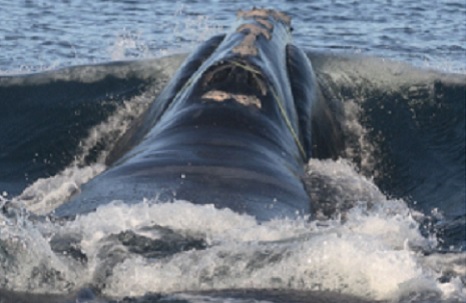
Massachusetts fishermen say feds are hypocritical in Gulf of Maine wind energy designation
A move to designate two million acres in the Gulf of Maine as a hub for wind energy is snagging a sharp hook from Massachusetts fishermen who say the development overlooks risks to the North Atlantic right whale. A handful of Bay State fishermen advocacy groups are teaming with counterparts from across New England in criticizing the Biden administration’s plans to industrialize the area off the coasts of Massachusetts, New Hampshire and Maine. Fishermen, however, say the industrialization of the two-million-acre area is “flatly inconsistent with a policy of endangered species protection.” “Fishermen are disheartened that the WEA designation favors foreign energy developers over marine mammal protection,” the Gulf of Maine Fishing Associations said in a statement last week. “This preferential treatment is in stark contrast to the federal government’s aggressive campaign to burden commercial fishing needlessly with crushing restrictions to protect whales.” more, >>click to read<< 08:43






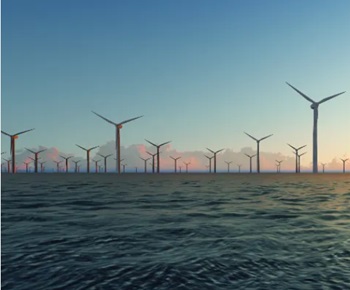
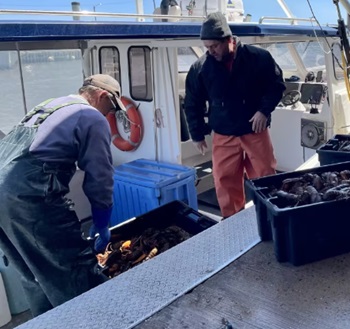



























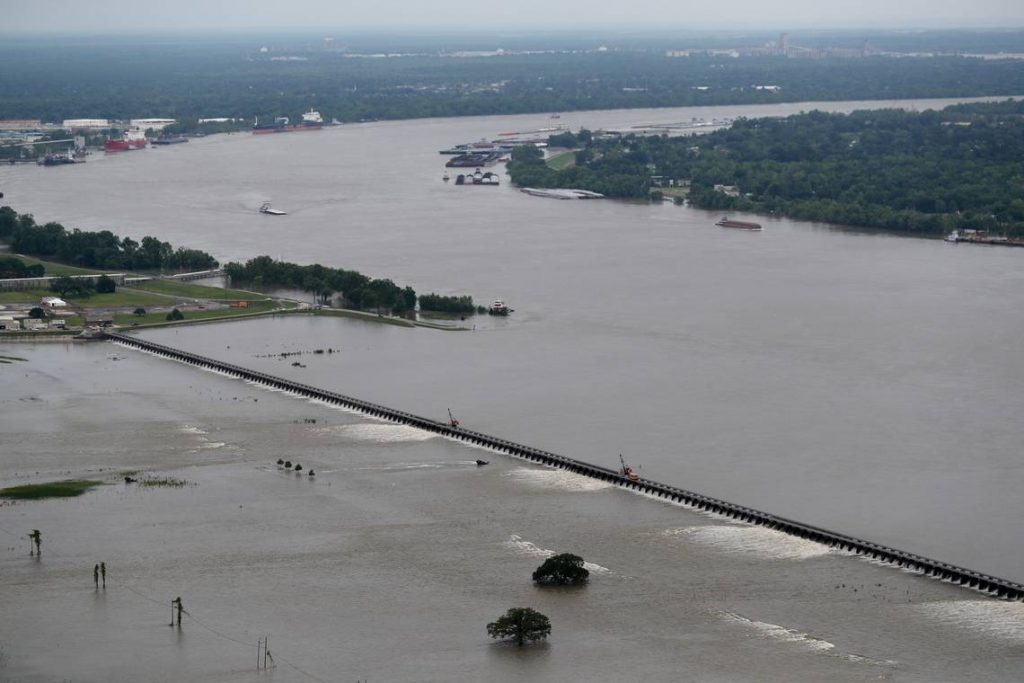


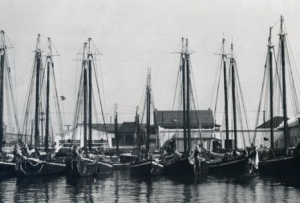
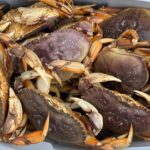
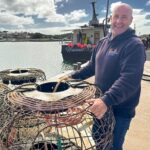


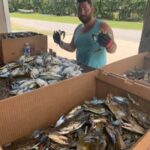
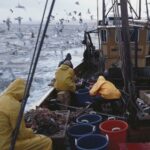

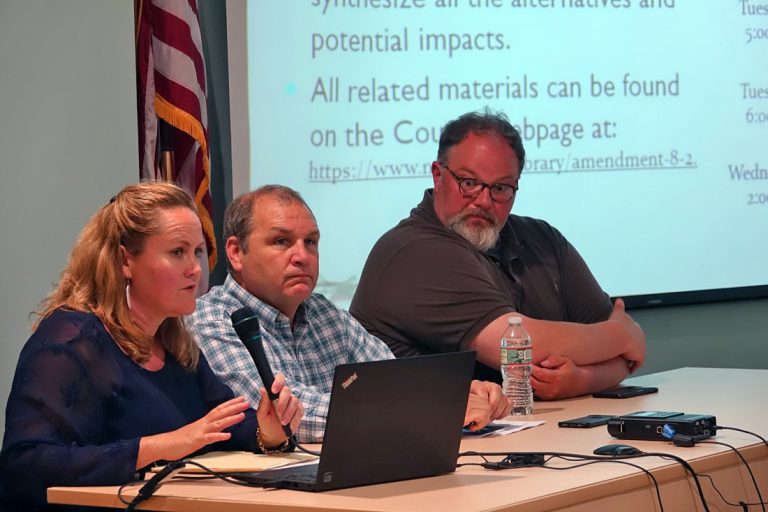
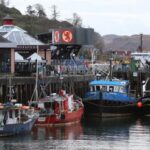
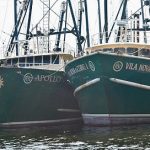




NOAA Seeks Public Comments on Exempted Fishing Permit Application for an On-Demand Trap/Pot/Gillnet Gear Study
Share this post